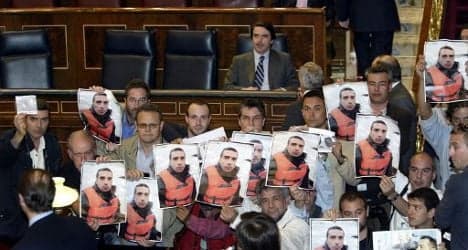Murder case against US soldiers not over: Judge

Spain's controversial decision to shelve several high profile international human rights cases received its first test on Monday after a judge refused to close the file on the death of a Spanish cameraman during the US invasion of Iraq in 2003.
The Spanish Government in February defied opposition pressure and voted to close investigations into as many as a dozen high profile Spanish-led international cases including alleged Chinese genocide in Tibet and possible torture in the US prison facility of Guantanamo Bay.
On Friday, the move — described by many as an end to Spain's concept of 'universal justice' — was made official when it was published in the country's Official State Bulletin.
Under the new rules, Spanish courts can only try crimes committed on Spanish soil.
But on Monday, Santiago Pedraz, a judge with Spain's National Court, said he wouldn't stop investigating the 2003 death of Spanish cameraman José Couso in Iraq.
Couso was one of three journalists killed on April 8th 2003 in Baghdad during the US invasion of the city.
Explaining his ruling, Pedraz said he was obliged to pursue the case under the Fourth Geneva Convention, ratified by Spain, which deals with the protection of civilians during war time.
He then stressed that internal rule changes in Spain didn't alter that international obligation.
Spain has issued a search and capture order for three US military personnel for crimes against the international community and homicide.
In January, Pedraz officially approached Spain's justice minister to complain about a lack of US cooperation in the case.
The Spanish Government announced earlier this year it was looking at shutting down up to a dozen cases involving genocide, torture and war crimes.
In February, a Spanish judge sought international arrest warrants for former Chinese President Jiang Zemin and four other top Chinese officials as part of a probe into alleged genocide in Tibet.
This sparked outrage from China with officials in that country saying they were "strongly dissatisfied and firmly opposed" to the move.
Spain's ruling conservative Popular Party then said changes to the country's universal justice regime were needed to avoid "useless disputes that only generate diplomatic conflicts".
A spokesperson for the PSOE slammed the move to scrap the international cases by saying: "It's as if the the Chinese regime were imposing the order of the day."
Don't miss stories about Spain, join us on Facebook and Twitter.
Comments
See Also
The Spanish Government in February defied opposition pressure and voted to close investigations into as many as a dozen high profile Spanish-led international cases including alleged Chinese genocide in Tibet and possible torture in the US prison facility of Guantanamo Bay.
On Friday, the move — described by many as an end to Spain's concept of 'universal justice' — was made official when it was published in the country's Official State Bulletin.
Under the new rules, Spanish courts can only try crimes committed on Spanish soil.
But on Monday, Santiago Pedraz, a judge with Spain's National Court, said he wouldn't stop investigating the 2003 death of Spanish cameraman José Couso in Iraq.
Couso was one of three journalists killed on April 8th 2003 in Baghdad during the US invasion of the city.
Explaining his ruling, Pedraz said he was obliged to pursue the case under the Fourth Geneva Convention, ratified by Spain, which deals with the protection of civilians during war time.
He then stressed that internal rule changes in Spain didn't alter that international obligation.
Spain has issued a search and capture order for three US military personnel for crimes against the international community and homicide.
In January, Pedraz officially approached Spain's justice minister to complain about a lack of US cooperation in the case.
The Spanish Government announced earlier this year it was looking at shutting down up to a dozen cases involving genocide, torture and war crimes.
In February, a Spanish judge sought international arrest warrants for former Chinese President Jiang Zemin and four other top Chinese officials as part of a probe into alleged genocide in Tibet.
This sparked outrage from China with officials in that country saying they were "strongly dissatisfied and firmly opposed" to the move.
Spain's ruling conservative Popular Party then said changes to the country's universal justice regime were needed to avoid "useless disputes that only generate diplomatic conflicts".
A spokesperson for the PSOE slammed the move to scrap the international cases by saying: "It's as if the the Chinese regime were imposing the order of the day."
Don't miss stories about Spain, join us on Facebook and Twitter.
Join the conversation in our comments section below. Share your own views and experience and if you have a question or suggestion for our journalists then email us at [email protected].
Please keep comments civil, constructive and on topic – and make sure to read our terms of use before getting involved.
Please log in here to leave a comment.